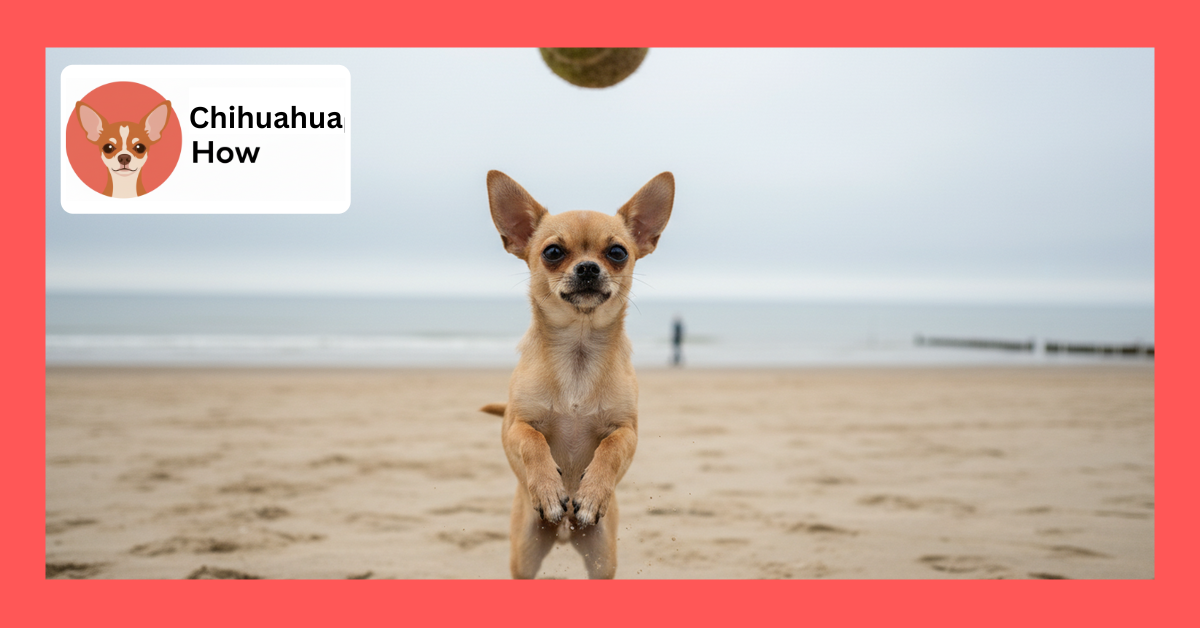Does your tiny Chihuahua sound like a miniature fire siren throughout the day? You’re not alone – Chihuahuas are among the most vocal toy breeds, with whining serving as their primary communication method.
Why does my Chihuahua whine so much? Chihuahuas whine primarily to communicate basic needs, emotional states, and physical discomfort. Common triggers include attention-seeking, separation anxiety, pain or illness, and unmet basic needs like hunger or needing to go outside.
Understanding your Chihuahua’s whining patterns is crucial for building a stronger bond and ensuring their well-being. According to certified trainers at Chewy, addressing the root cause rather than suppressing symptoms leads to better outcomes for both pets and owners.
The Science Behind Chihuahua Whining Behavior
Chihuahuas have evolved sophisticated vocal communication systems. Their small size makes them particularly dependent on vocalizations to express needs and emotions.
Unlike larger breeds that might use body language more effectively, Chihuahuas rely heavily on their voice. This breed tendency, combined with their strong attachment to owners, creates the perfect storm for excessive whining.
Recent veterinary behavioral studies show that toy breeds like Chihuahuas exhibit heightened sensitivity to environmental changes. This genetic trait makes them more likely to vocalize stress, excitement, or discomfort.
7 Main Reasons Why Your Chihuahua Whines
1. Attention-Seeking Behavior
Your Chihuahua has learned that whining gets results. Even negative attention reinforces this behavior pattern.
Signs include whining when you’re busy, during phone calls, or when other pets receive attention. The whining typically stops immediately when you acknowledge them.
2. Separation Anxiety
Chihuahuas form intense bonds with their owners. Post-pandemic adoption trends have increased separation anxiety cases by 30% according to professional trainers.
Symptoms include whining when you prepare to leave, excessive vocalization when alone, and destructive behavior. This anxiety-driven whining often escalates over time.
3. Physical Pain or Medical Issues
Sudden onset whining, especially in older Chihuahuas, often indicates underlying health problems. Arthritis, dental pain, and internal injuries commonly trigger vocalization.
Warning signs include whining during movement, loss of appetite, or changes in normal behavior patterns. Always consult your veterinarian first when whining behavior changes suddenly.
4. Basic Needs Communication
Your Chihuahua uses whining to communicate immediate needs. This includes hunger, thirst, needing bathroom breaks, or feeling too hot or cold.
Environmental factors like weather changes can increase whining frequency. Spring thunderstorms and winter holiday stressors particularly affect sensitive Chihuahuas, especially since they’re not well-equipped for cold weather.
5. Excitement and Overstimulation
Chihuahuas often whine when overwhelmed by positive emotions. Doorbell rings, visitor arrivals, and meal preparation commonly trigger excitement whining.
This type of whining usually accompanies jumping, spinning, or other hyperactive behaviors. The vocalization helps them release pent-up energy.
6. Fear and Stress Responses
Loud noises, unfamiliar environments, and new people can trigger stress-related whining. Chihuahuas’ small size makes them naturally more cautious.
Stress whining often includes trembling, hiding, or seeking comfort from owners. Environmental stressors like construction noise or neighborhood changes frequently cause this response.
7. Learned Helplessness
Some Chihuahuas develop learned helplessness, whining instead of problem-solving independently. This often results from overprotective owners who respond to every vocalization.
These dogs may whine when toys are out of reach, when doors are closed, or during minor inconveniences they could easily resolve themselves.
Chihuahua vs. Other Breeds: Whining Comparison
| Breed Type | Whining Frequency | Primary Triggers | Training Difficulty |
|---|---|---|---|
| Chihuahua | High | Attention, anxiety, excitement | Moderate to High |
| Golden Retriever | Low to Moderate | Basic needs, excitement | Low |
| German Shepherd | Low | Alert behavior, boredom | Low to Moderate |
| Beagle | Moderate | Scent tracking, separation | Moderate |
How to Stop Your Chihuahua From Excessive Whining
Step 1: Rule Out Medical Causes
Schedule a veterinary examination if whining behavior is new, intense, or accompanied by other symptoms. As trainer Traci Madson notes, “All the training in the world won’t make a difference if your dog is in pain or uncomfortable.”
Blood work, dental examinations, and joint assessments can identify underlying health issues causing discomfort-related whining.
Step 2: Identify Specific Triggers
Keep a whining diary for one week. Note timing, duration, circumstances, and your response to each episode.
Common patterns emerge quickly:
- Time-based whining (meals, walks, bedtime)
- Situational triggers (visitors, storms, separation)
- Attention-seeking patterns (during work calls, TV time)
Step 3: Implement Targeted Solutions
Address each trigger with specific strategies:
- Ignore attention-seeking whining completely – no eye contact, verbal response, or physical interaction
- Reward quiet behavior immediately – praise and treats when your Chihuahua is calm
- Provide mental stimulation – puzzle toys, training sessions, and enrichment activities
- Establish consistent routines – predictable schedules reduce anxiety-driven whining
- Create safe spaces – designated quiet areas where your Chihuahua can retreat
Professional Training Techniques
The “quiet” command teaches impulse control. Start by saying “quiet” during whining episodes, then immediately reward any pause in vocalization.
Gradually increase the quiet duration before rewarding. Consistency from all family members is essential for success.
Counter-conditioning helps with anxiety-driven whining. Pair triggers with positive experiences through gradual exposure and high-value treats.
Preventing Future Whining Problems
Early intervention prevents whining from becoming entrenched behavior. Puppy socialization reduces fear-based vocalizations in adult Chihuahuas.
Regular exercise and mental stimulation decrease boredom-related whining. Even 15-20 minutes of daily training provides adequate mental enrichment for most Chihuahuas. Consider incorporating scent tracking training to engage their natural instincts.
Establish boundaries early. Teaching your Chihuahua to self-soothe prevents learned helplessness and excessive dependency.
When to Seek Professional Help
Contact a certified dog trainer or veterinary behaviorist if whining persists despite consistent training efforts. Severe separation anxiety may require medication alongside behavior modification.
Warning signs requiring immediate professional intervention include:
- Whining accompanied by destructive behavior
- Self-harm during separation episodes
- Complete inability to calm down
- Regression in house training
The pet wellness industry increasingly emphasizes holistic care approaches. Modern treatment plans often combine traditional training with digital tracking tools and environmental modifications.
Understanding why your Chihuahua whines so much empowers you to address their needs effectively. Most whining behaviors respond well to consistent training and environmental management. Remember that patience and persistence are key to success with these sensitive, intelligent dogs.
Frequently Asked Questions
How long does it take to stop a Chihuahua from whining?
Training results typically appear within 2-4 weeks of consistent implementation. However, deeply ingrained whining behaviors may take 2-3 months to fully resolve. Success depends on identifying the root cause and maintaining consistent responses from all family members.
Is it normal for Chihuahuas to whine more than other dogs?
Yes, Chihuahuas naturally vocalize more than larger breeds due to their communication style and strong attachment tendencies. Their small size makes vocalizations their primary way to express needs and emotions, making them appear more “whiny” than other dogs.
Should I ignore my Chihuahua when they whine for attention?
Completely ignore attention-seeking whining by avoiding eye contact, verbal responses, or physical interaction. Any acknowledgment, even negative attention, reinforces the behavior. Instead, reward your Chihuahua immediately when they’re quiet and calm.
Can separation anxiety cause excessive whining in Chihuahuas?
Separation anxiety is a leading cause of excessive whining in Chihuahuas. Post-pandemic adoption trends have increased these cases significantly. Signs include whining when you prepare to leave, destructive behavior when alone, and inability to settle during your absence.
What medical conditions cause whining in Chihuahuas?
Common medical causes include arthritis, dental pain, luxating patella, hypoglycemia, and tracheal collapse. Sudden changes in whining patterns, especially in older dogs, warrant immediate veterinary evaluation to rule out underlying health issues.
Do Chihuahua puppies whine more than adults?
Chihuahua puppies typically whine more frequently as they learn to communicate their needs and adapt to new environments. Most puppy whining decreases with proper training and socialization. However, unaddressed puppy whining often becomes problematic adult behavior.
Can environmental changes increase Chihuahua whining?
Environmental factors significantly impact Chihuahua whining frequency. Seasonal changes, thunderstorms, construction noise, and household disruptions commonly trigger increased vocalization. Creating consistent routines and safe spaces helps minimize environmental stress responses.

